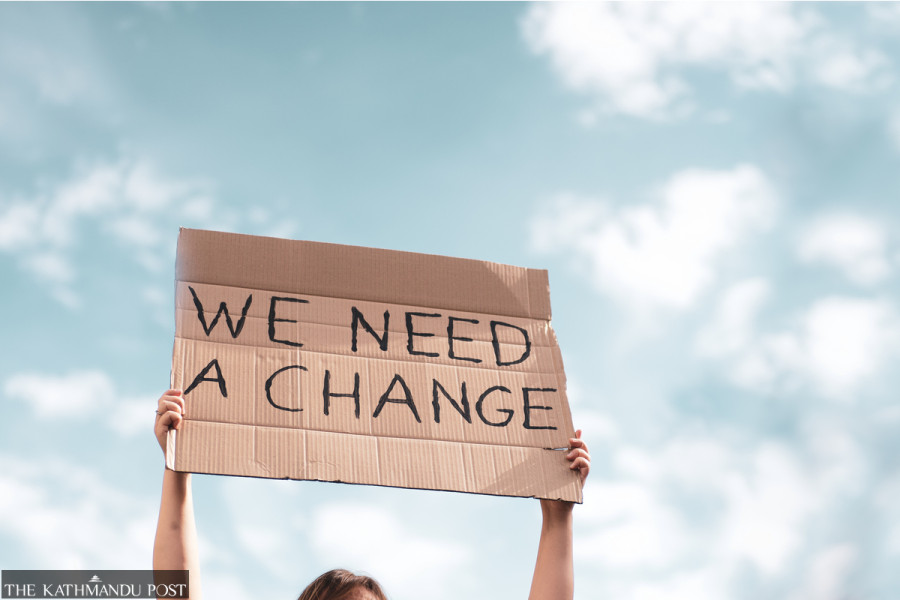Columns
Reimagining and owning politics
Why is politics—a value-neutral word—a taboo in Nepal?
Sushav Niraula
A casual follower of Nepali politics should notice how the phrase “dirty game” immediately follows when Nepalis are asked their opinion on politics. This negative connotation and perception of “politics” is evident in how the government and associated agencies have, time and again, framed the demands for quality and just governance from citizens as “political”. An example can be taken from the state’s response to citizens demanding better Covid-19 response, safeguarding the livelihood-culture of Khokana residents, reclaiming the Tudikhel land, and justice for Nirmala Pant. Alternatively, how citizens demanding genuine rights and better governance from the state feel the need to highlight the “apolitical” nature of their protests shows the pervasiveness of the distrust and pessimism with the "P" word in Nepal.
The question then remains: Why is the word “politics”—a value-neutral word—a taboo in Nepal? Understanding the clientelist nature of Nepali politics and the subsequent understanding of the word “politics” and “political” in exclusively partisan terms explains that piece of the puzzle. Before proceeding any further, let us first establish a working understanding of the word “politics”.
Politics, derived from the Greek word politiká, meaning “affairs of the cities”, is a value-neutral term. American political scientist Harold Lasswell defined politics as the process of “deciding who gets what, when and how”. The positive or negative aspect with respect to the word politics is that the user gets to add their respective values to the term. For example, political scientist Bernard Crick in his 1962 magnum opus In Defence of Politics, defines it as a specific human activity where conflict of interest among groups is adjudicated by discussion, persuasion and debate rather than by force or fraud. Perhaps Crick was concerned with cleansing politics; so he might have defined “democratic politics” rather than politics. But the critical question is: Why does politics have a negative spin and is understood in a partisan way in Nepal? Why can’t Nepalis, like Crick, take it as a force for good?
Clientelist politics
Like citizens of most clientelist democracies with weak and inefficient public institutions, Nepalis cannot rely on public institutions to fulfil their basic needs. From accessing hospital beds for sick relatives, school admission for children, to government support schemes, citizens depend on their network with political patrons. In this circumstance, rather than objective assessment, the way a citizen votes, engages in public advocacy or chooses to express opinions for or against a cause publicly is primarily affected by how it affects their existing relationship with their political patrons. This turns citizens selective and partisan in their advocacy whereby even a genuine demand for good governance is looked at from a partisan lens.
Problems with forsaking the political
There are two key issues with citizens and interest groups with genuine demands for better governance forsaking the “political”. First, while making the group’s cause credible in the short run, forsaking limits the scope of influence and subsequent change one can make, thus making it easier for the situation to return to the status quo. For example, the admittedly apolitical nature of protests by Enough is Enough marchers on the government’s handling of the Covid crisis or of Dr Govinda KC on mismanagement and corruption in Nepal’s health sector. While successful in the short run, given both the limited focus and apolitical positioning of the protests, they cannot change the fundamental value underpinning “who gets what, when, and how”, thus making it easier for things to fall back to the status quo.
Second and more important, forsaking perpetuates the idea that politics is dirty, thus making citizens pessimistic, unimaginative, and uninterested. This is detrimental, as politics is an arena where the fundamental question of “who gets what, when and how” is decided. Perhaps, it was this limitation in understanding what politics involves that made it difficult for Nepalis to accept Bibeksheel as a party when they first arrived at the scene.
Reimagining and owning the label
A small anecdote from the famous American TV drama The West Wing shows that cleansing and owning can probably work. In the Presidential debate of the American TV drama, the Republican nominee sarcastically questions the Democratic nominee, saying, “You are not an unthinking liberal, are you?”. The bashing of liberals as out-of-touch and unthinking was meant to be a passing shot—intended to give him a slight advantage over his Democratic rival. But rather than distancing himself from the term, the Democratic nominee then goes on a long protreptic detailing how, among other things, liberals ended slavery, enfranchised African Americans, and passed the Civil Rights Act. In retrospect, the retort became the defining moment for the Democratic nominee, propelling his candidacy. Like the Democratic nominee’s cleansing and owning of the “liberal” tag, Nepalis should own the “political” tag and change the way politics is practised and perceived.
For example, next time a citizen group protests for better governance, rather than the usual uneasiness with the term, they can start by stating how their fight is for good politics—the right kind of politics. Similarly, instead of outright brushing politics as a “dirty” game, citizens should actively select instances where good politics was practised and contrast them with cases of bad politics.
The reimagining process further requires citizens to borrow liberally from Nepal’s history, from the People’s Movement of 1990 and 2006, the Madhes Movement of 2007, the Satyagrahi-fashioned protests by Dr KC, to UML leaders crossing floor to dethrone former Prime Minister KP Sharma Oli, among others, can be used to cleanse “politics” and define it more nobly. This reimagining and subsequent owning can help make citizens imaginative and optimistic regarding their politics and thus encourage them to be constructive and change politics for the better.



 8.26°C Kathmandu
8.26°C Kathmandu















